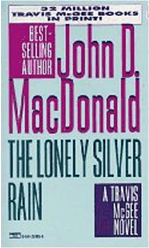

|
 |
|
|
Lonely Silver Rain
|
Please go to the new Coffee Coaster site implemented more gracefully in Wordpress. This page: http://brianrwright.com/CoffeeCoasterBlog/?p=3893 |
 Of all the John D. MacDonald Travis McGee novels I've read to this point (I think I've done approximately half of the 21), I'm giving this one—the final one, published in 1984, in the series—my 'least favorite' assessment... for a couple of reasons:
Of all the John D. MacDonald Travis McGee novels I've read to this point (I think I've done approximately half of the 21), I'm giving this one—the final one, published in 1984, in the series—my 'least favorite' assessment... for a couple of reasons:
Actually, he's in pretty good physical condition, but he knows he's slowing down considerably. His trademark quickness and reaction time are declining. Still he decides to take a job for an older, rich friend to locate a luxury yacht that was stolen from the friend. He finds the yacht, but the project starts to blow up from factoring into some part of the aforementioned drug trade... and some muy malo hombres.
Then for a while it appears scores of unknown assailants are after Travis as a consequence of him being linked to finding the boat. McGee expresses his dismay, and his very real fears of being killed, to his friend Meyer. He also carries on a conversation with himself regarding several of the dead he has witnessed in this case... younger people:
Then I let myself think about being young and dying. One of the basic ingredients of good and bad poetry, good and bad drama the world over. The end of all life is ere begun. A waste of the firm, springy, young flesh, of all the spices and juices. Tens of thousands of the young kill themselves every year. A pity. I wondered if it could be some kind of Darwinian design, getting rid of the ones unsuited for the rest of the ride. But that would leave out the earthquakes, the floods, the little and big wars, the famines and the deadly diseases that knock off the millions without regard to age or merit. No matter how many dead ones you see, indifference is never achieved except for the butchers. The dead young women [he had seen in the boat] had rocked me. A cruel waste. The dentist's daughter and somebody else's daughter. Grownups had helped each of them learn to walk, and had cried out their pleasure when the toddler, face screwed up in anxiety, had come tottering into the waiting arms. Somebody had proudly repeated their first words, read their first school papers, bought their first party dresses. And some people somewhere would have a wrenching, stinging, insatiable sense of loss.
So you can see the writer's ability has not dimmed. MacDonald still creates some of the most poetic prose of any key pounder or pen wielder on the planet, before or since. Perhaps it's only that the sleaze factor of this particular story—with drugs and Latino big shots strutting at the head of the deadly business that made prohibition famous—takes a lot of the plot (for yours truly) into the realm of "who cares?".
In this story, McGee and Meyer even work with a DEA agent, who unlike any drug cop who ever existed in the real world, actually seems to be an sympathetic and mildly intelligent character. Then you find yourself with the three of them—and a very hot, sultry chick—somewhere in an especially hard-to-explain-why-anyone-would-be-there-much-less-them place... and you don't care some more. Their plan gets taken care of, and McGee returns to his Busted Flush, to unravel an especially poignant and personal riddle. Before I get to this, and I'm not going to give anything away, let me backtrack to John MacDonald's anti-libertarian attitude about drugs and the underground economy in general.
After someone helping him out dies, Travis is ruminating again about death, then, because the death is so wrapped up in the sleazy-because-prohibited doings of the drugsters, he opines thusly:
If I were king of the country I would decree that on a certain date, three months hence, all green money in denominations of twenty dollars and up would become valueless [we're getting close! — ed.]. Everyone possessing that money could, during the three months, bring it in and exchange it for orange-colored money. One exchange per person. Bring in all your cash, and if you have more than one thousand dollars, fill out a form explaining [to the government] where you got it and how long you'd had it. There's untold billions of sleazy money out there. Untold billions that would never be turned in because possession of it cannot be explained. Bureaucracy gone quite mad, of course. But then we would be starting over, and because the gangster types would be afraid it could happen again, they would be wary about too much accumulation. By simple bookkeeping you could compute the unreturned green money and figure it as a deduction from the federal deficit, as though it had been a contribution to the government. Which, of course, it would be—as any piece of currency is a claim against the government...
Well, no need to even try to respond to this patent absurdity: there are so many flaws and holes, you could write a series of tomes on the subject. Travis is obviously hallucinating, getting senile, or both... but the most troubling discovery is that author MacDonald is either losing his mind, too, or the drug prohibition business has turned it to mush. Only a complete statist could suggest such an outrageous violation of economic freedom, and MacDonald is certainly not a complete statist. So he must have been smoking weed.
The plot then comes to its appropriate ends.
As usual for the Travis McGee series, The Lonely Silver Rain contains a sterling set of ruminations about life as Travis finds it. I especially like this perspective of the middle aged McGee about the beach bunny set:
Without my realizing it, it had happened so slowly, I had moved a generation away from the beach people. To them I had become a sun-brown rough-looking fellow of an indeterminate age who did not quite understand their dialect, did not share their habits—either sexual or pharmacological—who thought their music unmusical, their lyrics banal and repetitive, a square fellow who read books and wore yesterday's clothes. But the worst realization was that they bored me. The laughing, clean-limbed lovely young girls were as bright, functional and vapid as cereal boxes. And their young men—all hair and lethargy—were so laid back as to have become immobile...
Then a final parting shot on mortality:
And we walked back slowly, talking all the way. There was a lifetime of good talk ahead of us. There was another feeling I had abut myself more difficult to grasp. In the last few years I had been ever more uncomfortably aware that one day somewhere, I would take one last breath and a great iron door would slam shut, leaving me in darkness on the wrong side of life. But now there was a window on that door. A promise of light. A way to continue.
On second thought, The Lonely Silver Rain just moved up a notch in the Travis McGee panoply. Too bad it was the final chapter in possibly the greatest private detective series of all time.
###

Click banner to order, click here
for book review

Affiliate Sale
Items
 |
 |
|||
| New Pilgrim Chronicles Forum |